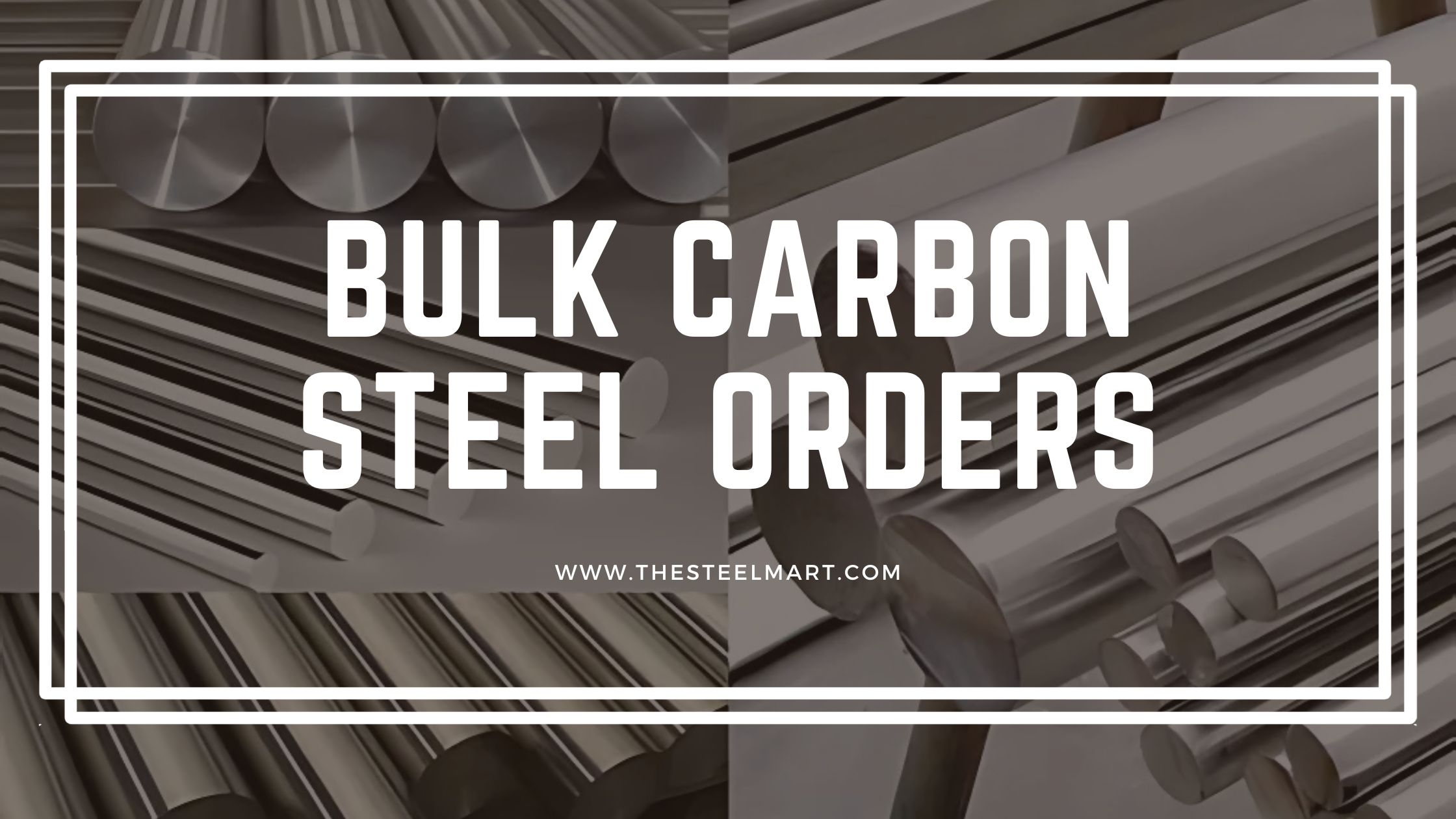Bulk Carbon Steel Orders: What Businesses Need to Know

Bulk Carbon Steel Orders: What Businesses Need to Know
Carbon steel remains one of the most indispensable materials in today's industrial world. Businesses depend on its strength, versatility, and cost-effectiveness from construction and automotive manufacturing to pipelines and machinery. However, when it comes to bulk procurement of carbon steel, the complexity increases. Bulk orders are not simply a matter of ordering larger quantities. They involve careful planning, technical understanding, strategic supplier selection, and effective logistics management.
For businesses considering a bulk carbon steel purchase, understanding the entire procurement process is essential. Mistakes at any stage can result in supply chain disruptions, increased costs, and missed deadlines. This article serves as a comprehensive guide to help companies navigate the critical aspects of bulk carbon steel orders.
Understanding Carbon Steel and Its Types
Before diving into procurement, it is crucial to have a clear understanding of what carbon steel is. Carbon steel is an alloy of iron and carbon, and depending on the carbon content, it can be categorized into low, medium, or high carbon steel. Low carbon steel, also known as mild steel, contains less carbon and is known for its ductility and ease of welding. Medium carbon steel offers a balance of strength and toughness, making it ideal for structural applications. High carbon steel, with its greater carbon concentration, is much harder but less ductile, making it suited for high-strength applications such as springs and cutting tools.
Choosing the right type of carbon steel is fundamental. The selection will depend largely on the intended application, required mechanical properties, and specific project requirements. Misunderstanding the differences between these grades can lead to purchasing steel that may not perform adequately, which could compromise the integrity of entire projects.
Planning Your Bulk Order
One of the biggest mistakes businesses make when ordering carbon steel in bulk is inadequate planning. A bulk purchase requires a precise understanding of material needs. Estimating quantities accurately ensures that companies neither overstock, leading to increased storage costs, nor understock, causing project delays. Planning should also account for potential waste during processing and cutting.
In addition to quantity, businesses must plan their budget carefully. Beyond the base material price, factors like freight charges, handling fees, taxes, insurance, and warehousing costs need to be considered. Bulk steel orders often tie up significant capital, so financial forecasting should include all possible expenses, with a contingency buffer for market price fluctuations.
Another vital part of planning is scheduling. Steel production and delivery timelines can be extensive. Failing to synchronize delivery schedules with project timelines can stall operations, causing losses much greater than the cost of the steel itself.
Choosing the Right Supplier
Not all steel suppliers are created equal. In bulk procurement, the reliability of your supplier directly impacts the success of your projects. Businesses must evaluate suppliers carefully, considering not only pricing but also quality certifications, track record, inventory capabilities, and logistics support.
A credible supplier like SteelMart ensures that the carbon steel meets recognized standards such as ASTM, ISO, and SAE. Working with suppliers who can provide Material Test Reports (MTRs) and Certificates of Conformance (CoC) gives businesses confidence in the product they are purchasing. Moreover, suppliers who specialize in bulk orders often have better logistical capabilities, ensuring timely deliveries even for complex projects.
Building strong, long-term relationships with suppliers can also offer additional advantages like flexible payment terms, better negotiation power, and priority allocation during times of material shortages.
Logistics and Delivery Management
Logistics is one of the most challenging aspects of bulk carbon steel orders. A significant volume of material needs to be packaged, transported, and delivered efficiently and securely. Depending on the distance and destination, different transport methods — trucks, rail, or sea freight — may be required. In many cases, multimodal transport solutions are the most effective.
Proper packaging is critical to prevent damage during transit. Steel products must be bundled securely and protected against environmental factors such as moisture, which can cause rusting. Insurance is another essential aspect of logistics for high-value shipments. In the unfortunate event of loss or damage during transit, having insurance protects the business from financial losses.
Scheduling deliveries also needs careful attention. Businesses must coordinate with suppliers to ensure that steel deliveries align with project schedules without causing site congestion or storage issues. Delayed deliveries can disrupt entire construction timelines, while premature deliveries might lead to storage problems and additional handling costs.
Understanding Market Pricing
Carbon steel pricing is influenced by a wide range of market factors. Fluctuations in raw material costs, energy prices, supply-demand imbalances, trade policies, and even geopolitical events can cause steel prices to vary significantly over short periods.
When planning bulk purchases, companies should monitor market trends and engage in discussions with their suppliers about the best times to buy. In some cases, entering forward contracts — where pricing is locked for future deliveries — can help protect against unexpected price surges.
Volume discounts are common in bulk orders. However, buyers must ensure that discounted prices do not come at the expense of quality. An attractive low price without the assurance of certified material can be a costly mistake in the long run.
Quality Control in Bulk Orders
Ensuring quality is even more critical when ordering carbon steel in bulk. The larger the quantity, the greater the risk if defects go unnoticed. Every batch of steel should be accompanied by quality documents like MTRs, verifying the chemical composition and mechanical properties of the material.
For particularly critical projects, businesses may also consider third-party inspections or testing upon receipt of the material. Although it adds upfront costs, this proactive approach can prevent far more expensive consequences such as product recalls, repairs, or legal liabilities.
SteelMart prides itself on maintaining strict quality control processes. Every bulk shipment undergoes multiple checks to ensure customers receive exactly what was ordered, without compromise.
Common Grades for Bulk Orders
Certain carbon steel grades are more popular for bulk industrial procurement. ASTM A36, known for its excellent welding and forming capabilities, is a common choice for structural applications. AISI 1018, another low-carbon steel, is favored for its machinability and versatility. Medium-carbon grades like AISI 1045 offer improved strength for components that require greater wear resistance.
Pipeline industries often specify grades like API 5L X42 and X52, which are designed for high-pressure environments. Meanwhile, engineering sectors may prefer EN8 and EN9 grades for their balance of toughness and strength. Businesses should consult with their project engineers and suppliers to choose the grade best suited to their needs.
Addressing Common Challenges
Several challenges come with bulk carbon steel orders. Besides fluctuating prices and logistical complexities, businesses often face the risk of supply chain disruptions. Steel shortages, especially during global crises, can cripple project timelines.
Companies that diversify their supplier base and maintain strategic reserves of critical materials are better positioned to handle such disruptions. Another approach is to establish long-term agreements with trusted suppliers like SteelMart, ensuring material availability even during periods of high demand.
Miscommunication is another frequent issue in bulk procurement. Clear, detailed contracts specifying grades, quantities, delivery terms, packaging standards, and payment schedules can significantly reduce misunderstandings and disputes.
The Strategic Value of Supplier Partnerships
Beyond transactional relationships, businesses should aim to build strategic partnerships with their carbon steel suppliers. Trusted suppliers can offer valuable market insights, assist in inventory management, provide technical consultations, and even help businesses innovate by introducing them to newer grades or manufacturing techniques.
At SteelMart, we believe that successful supplier partnerships are built on transparency, mutual trust, and a shared commitment to excellence. We support our clients throughout the entire supply chain process — from material selection and procurement to delivery and after-sales service.
Conclusion
Ordering bulk carbon steel is a strategic process that demands thorough planning, technical understanding, and trusted supplier relationships. A successful bulk order ensures that businesses meet project deadlines, stay within budget, and maintain product quality and compliance.
From selecting the right carbon steel grade and estimating accurate quantities to managing logistics and safeguarding quality, every step plays a crucial role in the overall success of a bulk procurement operation.
At SteelMart, we are committed to helping businesses navigate the complexities of bulk carbon steel sourcing with ease and confidence. Our extensive inventory, quality assurance processes, experienced team, and customer-centric approach make us the preferred choice for businesses worldwide.
If your next project requires high-quality carbon steel delivered reliably and efficiently, we invite you to experience the SteelMart difference. Contact our team today to discuss your bulk carbon steel needs and get a customized solution that works for your business.
Frequently Asked Questions (FAQs)
1. What are the main types of carbon steel available for bulk orders?
Carbon steel is typically categorized into low carbon (mild) steel, medium carbon steel, and high carbon steel. The choice depends on your application’s needs for strength, ductility, and hardness. Common grades for bulk orders include ASTM A36, AISI 1018, and AISI 1045.
2. How can I ensure the quality of bulk carbon steel purchases?
To ensure quality, always request Material Test Reports (MTRs) and Certificates of Conformance from your supplier. Partnering with trusted suppliers like SteelMart guarantees that the material meets all required standards and specifications.
3. What factors affect the price of bulk carbon steel?
The price of carbon steel is influenced by global supply and demand, raw material costs (like iron ore and coal), transportation charges, currency fluctuations, and market conditions. Bulk buying can often attract volume discounts, but prices can vary over time.
4. How long does it take to deliver a bulk order of carbon steel?
Delivery times depend on the size of the order, the specific grades requested, and your location. Typically, lead times range from a few days to several weeks. SteelMart works closely with clients to schedule deliveries according to project timelines.
5. Can SteelMart handle customized processing like cutting or coating for bulk carbon steel orders?
Yes, SteelMart offers value-added services such as cutting to length, surface treatment, and special coatings depending on customer needs. This helps businesses save time and reduces on-site processing work.
+91 8076217931






